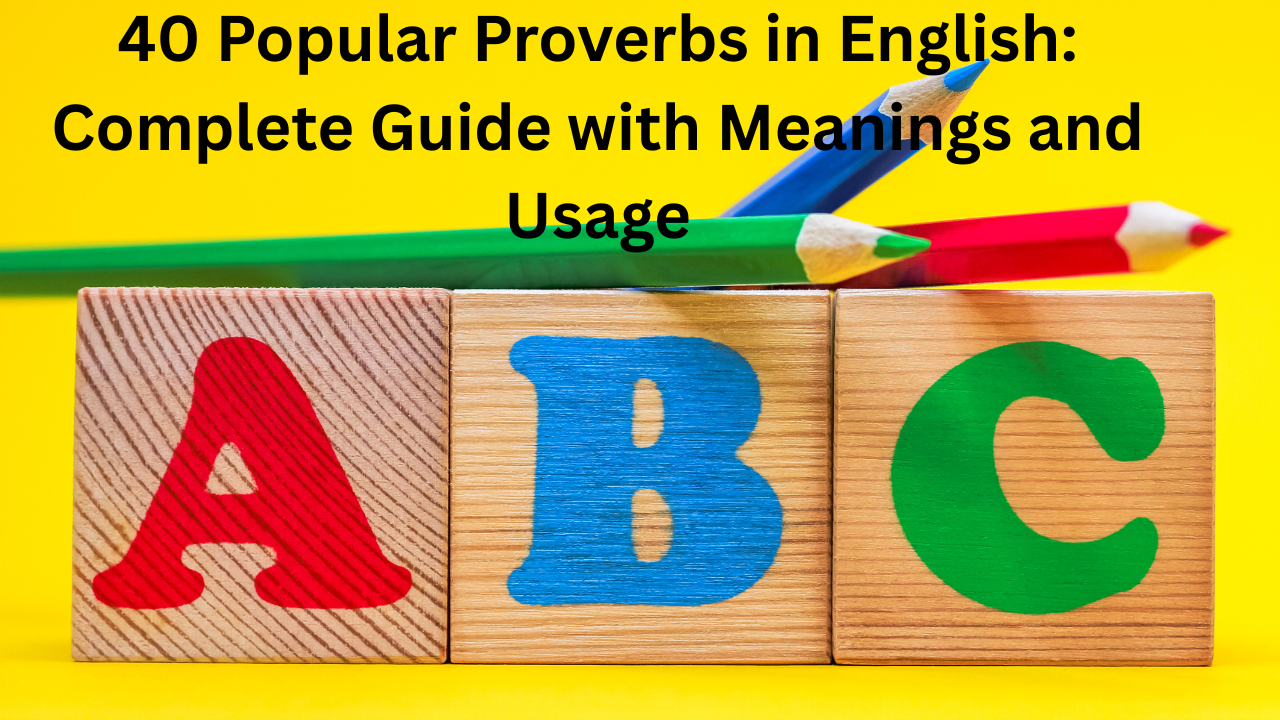Proverbs are timeless pieces of wisdom that have been passed down through generations, offering valuable life lessons in just a few words. These popular proverbs in English serve as powerful tools for communication, helping us express complex ideas and memorably. Whether you’re a native speaker looking to enrich your vocabulary or an English learner seeking to understand cultural nuances, mastering these proverbs will significantly enhance your language skills.
In this comprehensive guide, we’ll explore 40 of the most widely used English proverbs, complete with their meanings, origins, and practical examples. These English proverbs and sayings will not only improve your speaking and writing but also provide insight into English-speaking cultures and their values.
What Are Proverbs and Why Do They Matter?

Proverbs are short, well-known sayings that express general truths or pieces of advice based on common sense or experience. They serve multiple purposes in language and communication:
- Cultural transmission: Proverbs carry cultural values and wisdom across generations
- Memorable communication: Their rhythmic and often rhyming structure makes them easy to remember
- Universal appeal: Many proverbs address universal human experiences and emotions
- Linguistic efficiency: They convey complex ideas in concise, impactful ways
Understanding proverbs is crucial for anyone serious about mastering English, as they frequently appear in literature, speeches, everyday conversations, and business communications.
40 Most Popular English Proverbs with Meanings
1. “A penny saved is a penny earned.”
Meaning: Saving money is just as valuable as earning it. Usage: Use this proverb to emphasize the importance of frugality and careful money management.
2. “Actions speak louder than words”
Meaning: What you do is more important than what you say. Usage: Perfect for situations where someone needs to prove their intentions through behaviour rather than promises.
3. “All that glitters is not gold.”
Meaning: Not everything that appears valuable or attractive is actually valuable. Usage: Warn against judging things by their appearance alone.
4. “Better late than never”
Meaning: It’s better to do something late than not do it at all. Usage: Use when encouraging someone who feels they’ve missed an opportunity.
5. “Don’t count your chickens before they hatch.”
Meaning: Don’t assume something will happen before it actually does. Usage: Advise caution against premature celebration or planning.
6. “Every cloud has a silver lining”
Meaning: Even bad situations have some positive aspects. Usage: Offer hope and encouragement during difficult times.
7. “Fortune favours the bold.”
Meaning: People who take risks are more likely to succeed. Usage: Encourage someone to take calculated risks for potential rewards.
8. “Haste makes waste”
Meaning: Doing things too quickly often leads to mistakes and inefficiency. Usage: Advocate for careful, measured approaches to important tasks.
9. “If you can’t beat them, join them.”
Meaning: If you can’t defeat your opponents, it’s better to work with them. Usage: Suggest adapting to circumstances rather than fighting futile battles.
10. “Knowledge is power”
Meaning: Having information and understanding gives you advantages in life. Usage: Emphasize the importance of education and continuous learning.
Ready to master English proverbs and enhance your communication skills? Discover expert English tutoring at Tutionist.com and unlock the power of eloquent expression.
11. “Look before you leap”
Meaning: Consider the consequences before taking action. Usage: Advise careful consideration before making important decisions.
12. “Money doesn’t grow on trees.”
Meaning: Money is not easily obtained and shouldn’t be wasted. Usage: Teach financial responsibility and the value of hard work.
13. “No pain, no gain”
Meaning: You can’t achieve anything worthwhile without effort or sacrifice. Usage: Motivate someone to persevere through difficult challenges.
14. “Practice makes perfect”
Meaning: Repeated practice leads to improvement and mastery. Usage: Encourage consistent effort in skill development.
15. “Rome wasn’t built in a day.”
Meaning: Great achievements take time and cannot be rushed. Usage: Counsel patience when working toward long-term goals.
16. “The early bird catches the worm.”
Meaning: Being prompt and prepared gives you advantages. Usage: Encourage punctuality and proactive behaviour.
17. “Time heals all wounds”
Meaning: Emotional pain diminishes over time. Usage: Comfort someone going through grief or heartbreak.
18. “When in Rome, do as the Romans do.”
Meaning: Adapt to local customs and practices when in a new environment. Usage: Advise cultural sensitivity and adaptability.
19. “You can’t judge a book by its cover.”
Meaning: Don’t form opinions based on appearance alone. Usage: Encourage looking beyond surface impressions.
20. “A bird in the hand is worth two in the bush.”
Meaning: It’s better to keep what you have than risk losing it for something uncertain. Usage: Advice against taking unnecessary risks with guaranteed benefits.
21. “Absence makes the heart grow fonder.”
Meaning: Being away from someone makes you appreciate them more. Usage: Comfort someone missing a loved one or friend.
22. “Beauty is in the eye of the beholder”
Meaning: Different people find different things attractive. Usage: Acknowledge subjective preferences in aesthetics or taste.
23. “Curiosity killed the cat”
Meaning: Being too curious can lead to trouble. Usage: Warn against excessive nosiness or dangerous investigation.
24. “Don’t put all your eggs in one basket”
Meaning: Don’t risk everything on a single venture. Usage: Advise diversification in investments or life choices.
25. “Honesty is the best policy.”
Meaning: Being truthful is always the right approach. Usage: Encourage moral behaviour and transparent communication.
According to the Oxford English Dictionary, many of these proverbs have been part of the English language for centuries, reflecting enduring human wisdom and experience.
26. “Laughter is the best medicine”
Meaning: Humor and joy can help heal emotional and sometimes physical ailments. Usage: Encourage maintaining a positive attitude during difficult times.
27. “Necessity is the mother of invention.”
Meaning: When you really need something, you’ll find a way to create or obtain it. Usage: Highlight how challenges spark creativity and innovation.
28. “Out of sight, out of mind”
Meaning: When you can’t see something, you tend to forget about it. Usage: Explain why maintaining contact is important in relationships.
29. “Patience is a virtue.”
Meaning: The ability to wait calmly is a valuable quality. Usage: Encourage someone to remain calm during delays or setbacks.
30. “Strike while the iron is hot”
Meaning: Take advantage of opportunities when they present themselves. Usage: Encourage quick action when conditions are favourable.
31. “The pen is mightier than the sword.”
Meaning: Words and communication are more powerful than violence. Usage: Emphasize the power of education, writing, and peaceful dialogue.
32. “There’s no such thing as a free lunch”
Meaning: Everything has a cost, even if it’s not immediately apparent. Usage: Remind someone that apparent benefits often come with hidden costs.
33. “Two wrongs don’t make a right.”
Meaning: Responding to bad behaviour with more bad behaviour doesn’t solve problems. Usage: Discourage revenge and encourage ethical responses to conflicts.
34. “Variety is the spice of life”
Meaning: Having different experiences makes life more interesting. Usage: Encourage trying new things and avoiding monotony.
35. “Where there’s a will, there’s a way.”
Meaning: If you’re determined to do something, you’ll find a method to accomplish it. Usage: Motivate someone facing seemingly impossible challenges.
36. “You reap what you sow”
Meaning: Your actions determine your consequences. Usage: Emphasize personal responsibility and the law of cause and effect.
37. “A stitch in time saves nine.”
This means that addressing problems early prevents them from becoming bigger issues. Usage: Encourage preventive action and early intervention.
38. “Birds of a feather flock together”
Meaning: People with similar interests or characteristics tend to associate with each other. Usage: Explain social dynamics and friendship patterns.
39. “Don’t bite the hand that feeds you.”
Meaning: Don’t harm someone who helps or supports you. Usage: Warn against ungrateful or destructive behaviour toward benefactors.
40. “The squeaky wheel gets the grease.”
Meaning: The person who complains or asks for attention gets what they want. Usage: Encourage speaking up for your needs and rights.
How to Use Proverbs Effectively in Communication
Mastering these common English proverbs requires understanding not just their meanings but also when and how to use them appropriately:
In writing: Proverbs can add depth and cultural resonance to essays, articles, and creative writing. They work particularly well in conclusions or when summarizing key points.
In speaking, Use proverbs to support arguments, offer comfort, or provide memorable advice. However, avoid overusing them, as this can make your speech sound clichéd.
In professional settings, Some proverbs work well in business contexts, especially those related to hard work, planning, and success. Choose wisely based on your audience and situation.
Cultural considerations: Remember that proverbs are culturally specific. What resonates in one culture may not translate well to another, so consider your audience’s background.
Teaching Proverbs to English Learners
For educators and students working with English proverbs for students, here are effective teaching strategies:
Context-based learning: Always teach proverbs within meaningful contexts rather than as isolated phrases. Provide real-life scenarios where each proverb would be appropriate.
Visual aids: Use images, videos, or role-playing to illustrate proverb meanings. This helps students understand abstract concepts more concretely.
Comparative analysis: Discuss similar proverbs from students’ native languages to help them understand cultural parallels and differences.
Practice activities: Create exercises where students match proverbs to situations, complete partial proverbs, or create their scenarios for proverb usage.
Progressive difficulty: Start with simpler, more literal proverbs before moving to more metaphorical or culturally specific ones.
The Cultural Significance of English Proverbs
These traditional English sayings reflect the core values and beliefs of English-speaking societies:
Work ethic: Many proverbs emphasize hard work, perseverance, and the value of effort (“No pain, no gain,” “Practice makes perfect”).
Prudence and wisdom: Numerous sayings advocate for careful thinking and planning (“Look before you leap,” “A stitch in time saves nine”).
Moral values: Several proverbs promote honesty, kindness, and ethical behaviour (“Honesty is the best policy,” “Two wrongs don’t make a right”).
Pragmatism: Many reflect practical, down-to-earth approaches to life’s challenges (“If you can’t beat them, join them,” “Make the best of a bad situation”).
Understanding these cultural underpinnings helps both native speakers and learners appreciate the deeper significance of proverbial wisdom.
Enhance your English fluency and cultural understanding with personalized tutoring. Visit Tutionist.com to connect with expert English instructors who can help you master proverbs and much more.
Modern Relevance of Classic Proverbs
Despite their age, these proverbs remain remarkably relevant in contemporary life:
Technology and social media: “Actions speak louder than words” is particularly relevant in our digital age, where online personas don’t always match reality.
Financial planning: “A penny saved is a penny earned” resonates strongly during economic uncertainty and the importance of financial literacy.
Career development: “Knowledge is power” has never been more applicable than in our information-driven economy.
Personal relationships: “Absence makes the heart grow fonder” remains true in long-distance relationships and global mobility.
Business and entrepreneurship: “Fortune favours the bold” continues to inspire entrepreneurs and innovators worldwide.
Conclusion
These 40 popular proverbs in English represent centuries of accumulated wisdom, offering timeless guidance for navigating life’s challenges and opportunities. By understanding and appropriately using these English proverbs and their meanings, you’ll not only improve your language skills but also gain valuable insights into English-speaking cultures.
Remember that effective use of proverbs comes with practice and cultural sensitivity. Start by incorporating a few favourites into your daily communication, and gradually expand your repertoire as you become more comfortable with their usage patterns.
Whether you’re a student, professional, or language enthusiast, these proverbs provide powerful tools for expressing complex ideas and memorably. They bridge the gap between formal education and practical wisdom, making them invaluable additions to anyone’s linguistic toolkit.
The beauty of proverbs lies not just in their memorable phrasing but in their ability to connect us with generations of human experience. As you continue your English language journey, let these timeless sayings guide and inspire your communication, helping you express yourself with greater depth, clarity, and cultural awareness.
Ready to master English proverbs and elevate your communication skills? Join thousands of successful students at Tutionist.com and discover how expert tutoring can accelerate your language learning journey.
Frequently Asked Questions
What makes a proverb different from a saying or idiom?
Proverbs are specific types of sayings that offer advice or express general truths about life. Unlike idioms, which have meanings unrelated to their literal words, proverbs usually contain wisdom or moral lessons. They’re often complete sentences that can stand alone as advice, while idioms typically function as parts of larger sentences.
How can I remember all these English proverbs effectively?
The most effective way to remember proverbs is through contextual learning and regular practice. Associate each proverb with personal experiences or situations where it applies. Create flashcards with the proverb on one side and its meaning plus an example on the other. Practice using them in conversations and writing exercises. Focus on mastering 5-10 proverbs thoroughly before moving to new ones.
Are these proverbs used in formal writing and academic contexts?
While some proverbs can appear in formal writing, they’re generally more common in informal communication, creative writing, and speeches. In academic writing, use proverbs sparingly and only when they genuinely enhance your argument or provide cultural context. Business writing may incorporate certain proverbs, especially those related to work ethics and success, but consider your audience and context carefully.
Do other languages have similar proverbs to these English ones?
Yes, many cultures have proverbs that express similar wisdom, though the specific imagery and wording differ. For example, the concept behind “Don’t count your chickens before they hatch” exists in many languages with different metaphors. This universality reflects shared human experiences and values across cultures. Learning these parallels can help non-native speakers understand and remember English proverbs more easily.
How often should I use proverbs in everyday conversation?
Use proverbs naturally and sparingly in conversation. Overusing them can make your speech sound forced or clichéd. The key is to use them when they genuinely fit the situation and add value to your communication. Start with one or two proverbs you’re comfortable with, and gradually incorporate others as they become natural parts of your vocabulary. Quality and appropriateness matter more than quantity.
Read Also:







